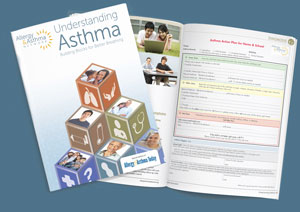How is Asthma Diagnosed?
- Home
- |
- What is Asthma?
- |
- Asthma Diagnosis and Testing
Diagnosing asthma is often difficult. For many, asthma symptoms tend to come and go. That’s why it’s important to talk with a doctor, preferably an asthma specialist, about your symptoms. Asthma specialists are board-certified allergists and pulmonologists who are familiar with asthma diagnosis and treatment guidelines.
Like a skilled detective, your doctor will investigate and look for clues to determine the cause of your symptoms. These clues include:
- your signs and symptoms
- medical history and family history
- physical exam
- lung function tests and other medical tests
There is no single factor or test that confirms an asthma diagnosis. Rather it is like putting together a puzzle to see if everything fits.
How is family and symptom history used in an asthma diagnosis?
Your doctor may ask questions about your asthma symptoms, your medical history, and your family history. Here are some questions to consider before your appointment:
-
When did you first notice symptoms?
-
How would you describe them? Cough? Trouble catching your breath? Noisy breathing?
-
How often do they happen?
-
How long do they last?
-
What makes them better or worse?
-
Do you have nighttime symptoms?
-
Do you or anyone in your family have a history of:
-
asthma?
-
environmental allergies (such as hay fever)?
-
food allergies?
-
rhinitis?
-
eczema (atopic dermatitis)?
-
bronchitis?
-
colds that linger for months instead of days?
-
- What health problems do you have?
- What is your home, school and/or work environment like?
- Do you smoke?
- Are you exposed to tobacco smoke from your family, or in the home or workplace?
- Do you cough or have problems catching your breath when exercising?
- Do breathing problems disturb your sleep?

How is a physical exam used in the diagnosis of asthma?
Doctors will watch the way your chest and stomach muscles move when you breathe. They will use a stethoscope to listen to air flowing in and out of your lungs.
Doctors may also look inside your nose. They are searching for signs of conditions that often go along with asthma, such as:
- rhinitis (inflammation of the nose)
- sinusitis (inflammation of the sinuses)
- nasal polyps (mucus-filled sacks in the nose)
They may examine the skin to look for signs of eczema (atopic dermatitis). Asthma and eczema are both caused by inflammation. Research suggests people with asthma are more likely to also have eczema. Having eczema as a young child and developing asthma later in life is part of the allergic march.

Download “Questions for Your Doctor” ➤
Tests Used to Diagnose Asthma
Your doctor has evaluated your health history and conducted a physical exam. If asthma is suspected to be the cause, then diagnostic tests are needed. Part of diagnosing asthma includes breathing tests or lung function tests (also called pulmonary function tests). These tests measure lung function.
Your doctor may also perform allergy tests to determine if allergens are a possible trigger for asthma symptoms. They may also do additional tests to rule out other conditions. No single test is used to diagnose asthma, but each is a piece of the puzzle.
Spirometry Test
Spirometry is the most common type of pulmonary function test. You take a deep breath in and then breathe out as hard as you can into the machine. This is done using a device called a spirometer. A spirometer is a computerized device which checks how well your lungs are working. The spirometer shows how much air you can breathe in and out and how fast you did it over a certain time. The results will show whether your airways are inflamed, narrow or tight.
You may do the test several times in one sitting. You might do it before and after using a quick-relief albuterol bronchodilator. Test results that improve after using the medication are a strong indicator of asthma.

Peak Expiratory Flow Test
A peak expiratory flow (PEF) test measures the speed of air flowing out of your lungs. Peak expiratory flow can be measured as part of spirometry. It can also be done using a handheld device called a peak flow meter (PFM).
The test starts with taking a deep breath. You then blow forcefully into the device. The device measures the speed of air that you forcefully blow out. PEF tests are part of spirometry in a doctor’s office, but you can use a PFM at home. Your doctor may want you to test at home to make sure your asthma treatment is working.
Methacholine Challenge Test
If you have no asthma symptoms on the day of your exam, the results of a lung function test may be normal. In this case, your doctor may order another test called a methacholine challenge. This is sometimes called a bronchoprovocation test.
Methacholine is a medication. It causes a brief tightening of the airways that is more intense in people who have asthma.
Methacholine challenge tests are done under the supervision of a doctor. You start by getting a baseline spirometry measurement. Then you inhale a small amount of methacholine and repeat the lung function tests. You take increasing doses of methacholine until a maximum dose is reached or you have a 20% drop in your lung function. If the test causes a decrease in lung function, you likely have an asthma diagnosis.
FeNO Test
FeNO stands for fractional exhaled nitric oxide. Nitric oxide is a gas produced by the cells in your lung as a response to inflammation. A FeNO or exhaled nitric oxide test measures the amount of the gas in your lungs. Higher amounts of FeNO suggests high amounts of inflammation in the lungs.
With this type of lung function test, you slowly and steadily breathe out into a handheld tube. As you breath out, the device measures the amount of gas in your breath. This will help your doctor measure inflammation in your lungs. Your doctor may repeat FeNO test at follow-up visits to look at signs of asthma control.
FeNO tests can also help your doctor determine the best treatment for you.

How do you diagnose moderate to severe asthma?
Each person’s asthma is unique and doctors evaluate it on a spectrum. Some people may develop moderate persistent asthma or severe persistent asthma. It is estimated that 5-10% of people with asthma have severe asthma.
Moderate persistent asthma involves experiencing symptoms daily and more than one night per week. Severe persistent asthma involves symptoms throughout the day and most nights per week. Severe asthma patients may go to the emergency department or hospital often. They may be unable to go to work or school, or do simple activities, due to breathing problems.
Some people may develop a subtype of asthma called eosinophilic asthma. This is a severe form of asthma. Eosinophils are white blood cells. They fight infection but also cause inflammation. Research has shown a link between too many eosinophils in the blood and severity of asthma attacks. Diagnosis of eosinophilic asthma may involve blood tests, a sputum sample or a bronchial biopsy of fluid examination.
It’s important to get a moderate to severe asthma diagnosis so that you and your doctor can determine the best treatment options. Biologic medications are often prescribed to treat eosinophilic asthma.

Get a Free Copy of Our "Understanding Asthma" Guide ➤
Questions & Answers (Q&A) about diagnosing asthma
Here are some of the most common questions we’re asked about diagnosing asthma. If you have any questions you would like to see answered here, please email our editor.
Can you take an asthma test at home?
You cannot be diagnosed with asthma from home. An asthma diagnosis is a combination of several different factors. There is no one specific test. It is important to meet with an asthma and allergy specialist or pulmonologist (lung doctor) to get a complete and accurate diagnosis.
A peak expiratory flow (PEF) test is one asthma test that can be done at home. But this is done after you are diagnosed with asthma. A PEF test helps track the effectiveness of your asthma treatment plan.
Do I have COPD or asthma?
Asthma and COPD share similar symptoms. These include persistent cough, wheezing and shortness of breath.
Asthma is usually diagnosed early in life. Diagnosis of asthma includes a physical exam, family history of allergic diseases and lung function tests. COPD tends to occur in people after the age of 40. It involves lung diseases, including emphysema and chronic bronchitis, that worsen over time. Symptoms include increased mucus or phlegm and respiratory tract infections. COPD is often the result of long-term, heavy cigarette smoking.
Learn more about asthma, COPD, and when the two meet.
How is asthma diagnosed in adults?
Diagnosing asthma in adults includes reviewing symptoms, family history and a physical exam. If your symptoms suggest asthma, then the doctor may recommend lung function testing to confirm the diagnosis.
Once a diagnosis of asthma is confirmed, you and your doctor will discuss treatment options. You’ll develop an Asthma Action Plan and get prescriptions to medications if needed. Sometimes it can take a bit of time to find the treatment plan that best manages your symptoms.
How is asthma diagnosed in children?
In children under the age of 5, most asthma lung function tests are not reliable. So asthma in young children is primarily diagnosed based on symptoms, family and health history, and a physical exam. If allergies (pollen, mold or pet dander) are a suspected asthma trigger, then your doctor may consider allergy testing (such as skin tests). For most children under 5, confirmation of a diagnosis of asthma may have to wait until they’re older and can under undergo diagnostic testing.
In older children and teens, asthma is diagnosed the same way it is in adults.
How is occupational asthma diagnosed?
Occupational asthma is diagnosed the same as other types of asthma. Doctors will ask for detailed information about your workplace. Do you work in an old building with potential mold? Are there chemicals used where you work? Are fumes or dust present where you work?
Your doctor will need to understand any potential triggers you are regularly around. You may have to undergo allergy testing as part of the diagnosis.
Are there other conditions that may look like asthma or complicate asthma?
There are other types of respiratory conditions that are different than asthma. The symptoms, diagnosis and treatment can vary depending upon the condition. Here are some of them.
See Related Pages
- Asthma Attack
- Asthma Camp
- Alternative and Natural Asthma Treatments
- Asthma Symptoms & Triggers
- Asthma Medication and Treatment
- Asthma Diagnosis and Testing
- Lifestyle Changes to Manage Asthma
- Asthma Management and Control
- Asthma Patient Assistance
- Asthma Action Plan
- What is Severe Asthma?
- Asthma and Exercise
- Asthma in Babies and Children
- Asthma and Pregnancy
- Vaping and Smoking with Asthma
- Asthma Dictionary
- Asthma Statistics
- Asthma Webinars
- Ask the Allergist About Asthma
Bradley Chipps, MD, FACAAI, is a board-certified allergist and pediatric pulmonologist with Capital Allergy and Respiratory Disease Center in Sacramento, California. He earned his medical degree from University of Texas Medical Branch in Galveston in 1972. He is Past President of the American College of Allergy, Asthma and Immunology (ACAAI).
